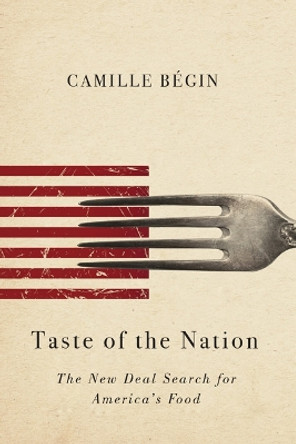Description
Camille Begin shapes a cultural and sensory history of New Deal-era eating from the FWP archives. From "ravioli, the diminutive derbies of pastries, the crowns stuffed with a well-seasoned paste" to barbeque seasoning that integrated "salt, black pepper, dried red chili powder, garlic, oregano, cumin seed, and cayenne pepper" while "tomatoes, green chili peppers, onions, and olive oil made up the sauce", Begin describes in mouth-watering detail how Americans tasted their food. They did so in ways that varied, and varied widely, depending on race, ethnicity, class, and region. Begin explores how likes and dislikes, cravings and disgust operated within local sensory economies that she culls from the FWP's vivid descriptions, visual cues, culinary expectations, recipes and accounts of restaurant meals. She illustrates how nostalgia, prescriptive gender ideals, and racial stereotypes shaped how the FWP was able to frame regional food cultures as "American."
About the Author
Camille Begin is a Social Sciences and Humanities Research Council postdoctoral fellow at the Centre for Sensory Studies at Concordia University in Montreal.
Reviews
ASFS Book Award, Association for the Study of Food and Society, 2017
"A fascinating archive on how American eating shifted during the years of the Depression. It provides a kind of hidden history of early-twentieth-century eating, documenting the role of different non-white middle class groups in shaping the American palate in ways that continue to resonate." --David E. Sutton, author of The Restaurants Book: Ethnographies of Where We Eat
"Who knew that modern food writing originated in the New Deal's Federal Writers' Project? Camille Begin convincingly shows how the FWP (TM)s sensory concerns linked food to race and place. Her lively account recognizes the importance of food writing in drawing the boundaries that transform modern culinary nationalism, ethnicity and regionalism into 'sensory economies.'"--Donna Gabaccia, author of We Are What We Eat: Ethnic Food and the Making of Americans
"Taste of the Nation offers fascinating insights into how regional culinary traditions were incorporated into the New Deal's nation-building project."--Journal of Southern History
"Her five chapters do read like a gourmet five course meal within a sensory archive with no detail too small, beginning with her wonderful introductory courses of 'Romance of the Homemade' and 'Tasting Place, Sensing Race' and concluding with a thoughtful and well-placed chapter titled 'A Well-Filled Melting Pot'. Bon Appetit!"--Journal of Contemporary History
"Taste of the Nation is a valuable addition to the literature: a sophisticated reading of the sources that shows the importance of race, gender, and ethnicity in shaping our attitudes toward food."--Journal of American History
"Recommended."--Choice
"An astute sensory history rooted in a firm theoretical base. . . . Begin's lively account, complemented with striking photographs, captures a moment when the nation pioneered a new understanding of its culinary heritage. Begin offers scholars and general readers much to savor."--Agricultural History
"Taste of the Nation is most useful--and it is very useful--as a model for ways to apply sensory history in the realm of food studies. It offers theoretical ways of bridging ideas and flavors, the work that seems often unfinished in food studies."--H-Net
"Gives us the best of both worlds: sharp, scholarly, critique, essential to solid research and good teaching; and rich, sensory, description, conveyed with exquisite writing, where you can smell the acrid smoke from the wood stove, hear the clatter of the cutlery and the screeching of the dining room chairs. It is a text I relished and learned much from, about American gustatory nationalism, and its relationship to race and gender in New Deal food writing."--Krishnendu Ray, author of The Ethnic Restaurateur
Awards
Winner of
Book Information
ISBN 9780252081705
Author Camille Begin
Format Paperback
Page Count 240
Imprint University of Illinois Press
Publisher University of Illinois Press
Weight(grams) 399g
Dimensions(mm) 229mm * 152mm * 20mm









